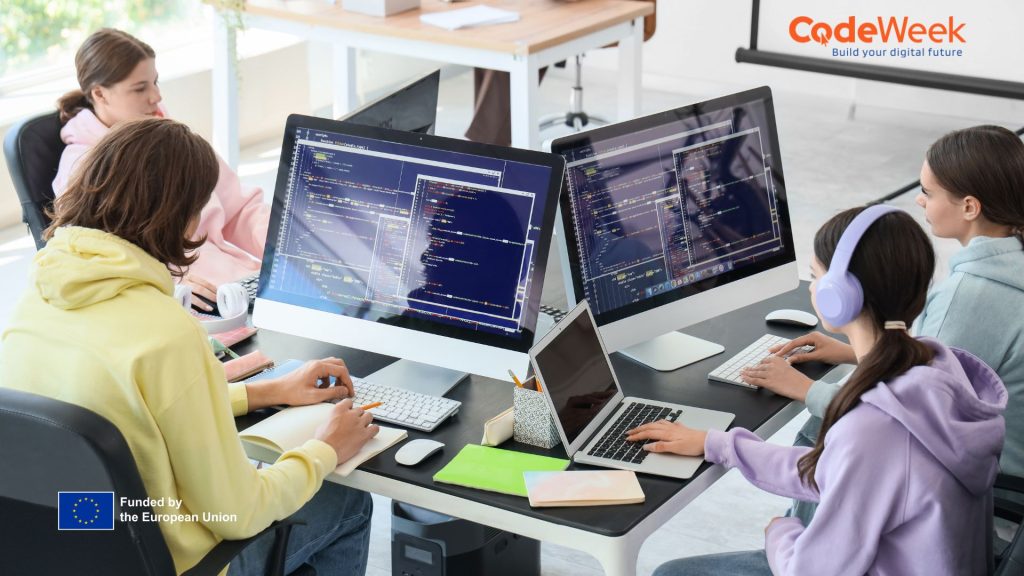Listening to Young Voices of EU Code Week: Highlights from the Code Week Youth Council 2025
Right at the heart of this year’s EU Code Week (11–26 October 2025), something new took shape. On 16 October we invited students to take the mic. Our pilot Youth Council gathered upper-secondary, IB schools, vocational and early-university students from several Code Week countries.
Why did we do it? Because EU Code Week is for young people, and the best way to shape meaningful activities is to ask them directly. This first meeting helped us hear what digital skills mean to them, what gets in the way at school, and how our community can lower the barrier to entry. We’re sharing the highlights below so teachers, volunteers, hubs, ambassadors and partners can hear those voices too.
What “digital skills” really mean to the Youth
“It’s like a language — you get better by using it, but someone has to show you the first words.” said one youth representative.
- More than coding. Students framed digital skills as navigating a digital world — devices, platforms, online services, school tools, even the Internet of Things.
- From consumer to creator. They don’t want to stop at scrolling; they want to make things: apps, stories, services, data-driven projects.
- Safety and critical use. Spotting scams, protecting accounts and behaving responsibly online belong side-by-side with technical skills.
- Purpose matters. Many linked digital skills to contributing to their communities and a better Europe.
What they see around them at school
- A wide spectrum of confidence. Small advanced groups; a large “can use devices but not deeply” middle; and a group mainly using social media.
- Overconfidence vs depth. Six hours a day on a phone doesn’t equal file management, spreadsheets or shortcuts.
- Too little, too late. ICT often arrives late and passively (“this is Word”) rather than creatively (“make something”).
- Intimidation and pace. Beginners can be left behind when classes accelerate for the most advanced.
- Time and energy. After-school clubs struggle when learners are tired; multi-day experiences help, but cost and access matter.
- Digital inequality. Equipment without pedagogy doesn’t help; rural or less-resourced schools face extra barriers.

Ideas that could make a difference
1) Smaller, playful entry points
- Micro-challenges students can do in groups; short, winnable tasks with progress or something to “unlock”.
- “Duolingo for coding & AI.” Five minutes, one concept, one success — stacked over time.
- Soft entry before hackathons: pre-sessions on “how to join your first hackathon” and beginner-friendly tracks.
2) Connect digital to real interests
- Pair coding/AI with biology, history, theatre, languages, music — digital as an enabler, not an end.
- Plug-and-play lesson inserts (multilingual) that any subject teacher can run once per term.
- Show pathways where you don’t have to be a software engineer to use digital skills meaningfully.
3) Support teachers, gently
- Classroom-ready micro-activities that don’t require ICT expertise.
- Clear guidance on teaching with AI (brainstorming, feedback, checking) rather than banning it.
- Encourage student-teacher clubs or short bootcamps co-led by confident peers.
4) Reduce the fear factor
- Make it normal to start late and start small.
- Offer 3–4 day focused programmes (online or in-person) where learners leave with something tangible.
5) Make opportunities visible in schools
- Reach students through teachers and classrooms, not only social media.
- Translate and localise resources so more countries can use them.
- Build things that last — durable initiatives, not one-off experiments.
How young people want to learn AI
“We can’t fight AI — we need to learn to use it fairly and smartly.”
- Treat AI as a tool, not a shortcut.
- Teach prompting basics, level-appropriate explanations, and how to critically check outputs.
- Model fair, transparent use in schools and address the “hypocrisy gap”.
- Integrate AI across subjects: data for maths projects, scriptwriting for drama, explanations for biology, and more.
How we’ll use this input
This pilot was designed as an opportunity to listen. We’re now reflecting on how these insights can inform the way our community designs challenges, supports teachers, plans hackathons and communicates with beginners — while staying true to Code Week’s grassroots, inclusive spirit. Our first action is this article, which aims to share these findings with the heart of EU Code Week.
We received very positive feedback about the pilot and suggestions for the continuation of the Youth Council. It will be a discussion for us that we will facilitate with our community and educators moving forward.
Thank you
Huge thanks to the students who joined from different countries and school systems, and to the educators and volunteers who helped connect them with us. Your time, honesty and imagination are already shaping the conversation.
If you’re a teacher or hub lead keen to try micro-challenges or subject-linked inserts, keep an eye on our channels for resources you can use in class. If you’re a student who wants to share your perspective, speak with your local Code Week community or reach out during future calls for participation.
Together, we can make the path from “curious to confident creator” shorter, kinder and a lot more fun.


